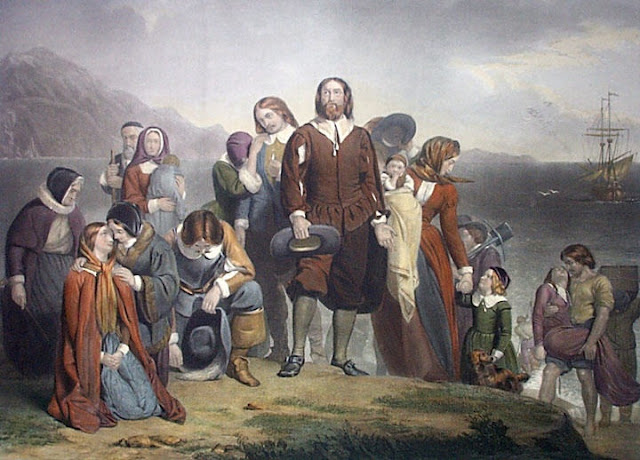By Pastor Dewey Roberts - Posted at Vanguard Presbyterian Church:
Thanksgiving in the US is one of the best and purest of holidays. It has long been my opinion that it is a truly Christian holiday even if it is not specifically sanctioned by Scripture. It is a Christian holiday because the emphasis is on giving thanks to God for all His bountiful care. Yet, even Thanksgiving is not without controversy. There are different accounts of the first Thanksgiving among the colonists and the Wampanoag Native Americans. It was a new start for those people who had fled to America for religious freedom, but it was effectively the beginning of the end for those who already lived in this country. Every year since 1970, Native Americans have been gathering at Cole’s Hill in Plymouth, Massachusetts for a National Day of Mourning. It was the beginning of our world and the end of theirs. We have all heard the story of the first Thanksgiving in 1621 when the Wampanoag tribe under the leadership of Massasoit sat down with the members of the Plymouth colony for a three-day feast. Yet, there were settlements in the US that predated Plymouth colony. So, why do we not remember them?Pensacola in Florida was founded by the Spanish in 1559—sixty-one years before the Mayflower landed at Plymouth Rock. John Calvin was still alive at that time. St. Augustine in Florida was also established in 1565 and is the oldest continuously inhabited city in the New World. On September 8, 1565, Pedro Menendez de Avila, the Spanish conquistador. arrived with 600 passengers and soldiers, just beating the French captain, Jean Ribault, who founded Fort Caroline in Florida near present day Jacksonville. In fact, Menendez and Ribault had a short skirmish at sea before they both arrived ashore. Menendez and his soldiers hastily built a fort for their protection as Ribault and his men did as well. So, why are not Pensacola, St. Augustine, Fort Caroline or Jacksonville more remembered when Americans are taught the history of their nation?
For one thing, the French and Spanish settlements in the New World were not for the purpose of seeking religious freedom. Those nations were interested in materialistic goals—whether it was trade, new territories, or the inevitable search for the ‘fountain of youth.’ Thus, a celebration of thanksgiving for God’s protection and bountiful care did not arise from those settlements.
